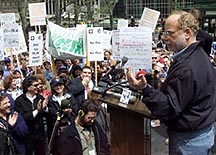|
September 4, 2000 Features Never
Mind the Bollocks The
Battle of Philadelphia Working
It Black
Radicals Regroup Mad
Sheep Scare News Cleaning
Up Star
Strike Renegade
or Redeemer? The
New Front Profile Editorial Appall-O-Meter Dialogue:
The Balkans A
Humanitarian Crusade A
Man for All Seasons Interstate
Rambler England's
Dreaming Under
the Influence Vanishing
Act Presidential
Dance Parties |
Star Strike
By
Ben Winters
Chicago
 |
| Richard Dreyfuss spoke at a New York rally on the first day of the actors' strike. Credit: Peter Morgan/Reuters. |
For more than a decade, members of the Screen Actor's Guild (SAG) have been grumbling about their contract with advertisers. Last year they made William Daniels their president on the strength of his promise to negotiate a better deal. The moment of truth came May 1, when Daniels led SAG - along with its sister union the American Federation of Television and Radio Artists (AFTRA) - into a strike that has become the longest walkout in the union's history. Three months later, there's no end in sight.
Actors and other workers are looking to modernize the system under which performers are paid for commercial work, they just can't agree on how to do it. Actors in network television commercials (and those in radio spots) have long been governed by a "pay-for-play" arrangement, under which they receive a check each time their performance is aired. Actors in cable commercials, by contrast, receive a flat fee only.
In April's negotiations, SAG/AFTRA asked that the pay-for-play scheme be extended to cable, a suggestion advertising industry representatives categorically rejected. Advertisers want the opposite: to banish pay-for-play entirely and replace it with increased flat fees. Meeting periodically under federal mandate, the two sides have had zero success in narrowing the gulf. Many in the rank and file see advertisers' intransigence as a strategy to break the unions.
Despite the celebrity status of many union members, attracting press has been a major stumbling block. The unions' adversary is an industry that creates messages for a living, and possesses a natural advantage in television coverage. "When you're on strike against the companies that control and subsidize the media," says SAG/AFTRA Midwest spokeswoman Linda Swenson, "it's difficult to get the word out."
![]()
|
In These Times ©
2000
Vol. 24, No. 20 |
